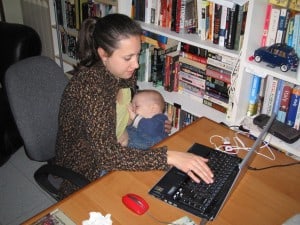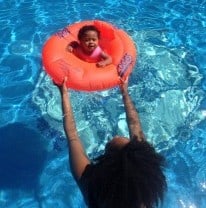This article is part of a series discussing the LLL philosophy concepts. You may be aware that there are ten concepts underlying what LLL does. As Leaders we sign up to these, and they help to shape our responses, the way we run meetings, and the type of information that we provide.
“In the early years, the baby has an intense need to be with his mother which is as basic as his need for food.”
What does this concept mean?
This is on the face of it one of the more straightforward concepts to understand. It says that although breastfeeding is fundamental to a baby’s well-being, the reason it matters is not just nutrition. For a baby in a nursing relationship, being close to his mother makes all the difference. Breastmilk doesn’t just feel like food; it feels like love.
Doing our best as mothers, and working hard on building a strong and lasting breastfeeding relationship, involves devoting intensive time in the early years to getting to know our babies, and working on understanding their needs.
Breastfeeding is a great excuse to stay close to your baby: no one can argue that he doesn’t need you.
When mothers express an interest in becoming Leaders, they are asked to talk about how they have handled any separation from their babies to give careful attention to their needs. Obviously work plays a part in this: if you’re away from your child for several hours a day from very early, you’ll need to put particular effort into keeping breastfeeding going. Young babies need milk through the day, but they also yearn for connection with their mothers, so restoring and replenishing that connection when you’re reunited becomes so important.
What doesn’t this concept mean?
None of our LLL philosophy prescribes only one way of parenting. Although many of the principles of Attachment Parenting provide sound science behind a baby’s intense need for his mother and it fits well with LLL values, still our philosophy never states that mothers and their babies must be together at all times, carried in a sling and bed sharing.
Am I ignoring my baby’s needs by having a job?
You are the expert on your own baby and the only one who understands your baby and your whole family’s needs. It can be heart-breaking to leave a small baby regularly, and many mothers find that the looming end of their maternity leave gives them a chance to look with fresh eyes at their work situation.
Some find they can negotiate part time hours, or flexible working or working from home; others look at finding childcare close to their workplaces. For yet others, the reality is that full time work is unavoidable, and that means extra effort to be sure that they can be close to their babies all the rest of the time. Some mothers even start cosleeping once they return to work, to gain in night-time closeness what they’re losing by having to be away in the day (and to cater for the “reverse cycling” that many babies start – feeding a lot in the night to make up for being apart from their mothers in the day).
Aren’t all LLL Leaders rich stay-at-home mothers?

If you’re wondering whether LLL Leadership could be for you, then please don’t feel you’re automatically excluded by having a job – talk to your local Leader who will happily share our prerequisites for Leadership with you. Alternatively, contact [email protected], to see whether LLL philosophy is a good fit for you and whether you’ve got a space in your life for Leadership.
By Helen Lloyd & Benaifer Bhandari
Further reading
chapter 14 of The Womanly Art of Breastfeeding, “When you can’t be with your baby” LLLI. London: Pinter & Martin, 2010.
Why Love Matters: How Affection Shapes a Baby’s Brain. Sue Gerhard. Routledge, 2004
Working and Breastfeeding
Workday practicalities
If you leave your baby
When mum can’t be there
Expressing your breastmilk
Hand expression of breastmilk
Staying home instead
Safe Sleep and the Breastfed Baby
My Journey Returning To Work, a mother’s story
Mothers on … Breastfeeding & Work
Working and Breastfeeding Made Simple. Nancy Morbacher. Praeclarus Press, 2014
Nursing Mother, Working Mother. Pryor Harvard Common Press, 1997
You might also be lucky enough to find Hirkani’s Daughters: women who scale modern mountains to combine breastfeeding and working in your local group’s library – another great reason to go to meetings!
This article was originally published in Breastfeeding Matters, issue 210, Nov/ Dec 2015.
Copyright LLLGB 2016




